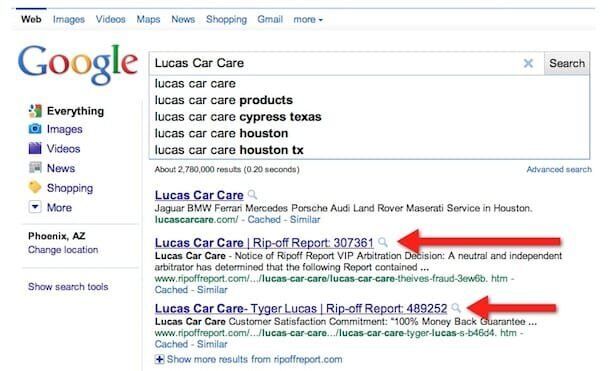
12 Mar How To Remove Ripoff Report In Google
Not all luxury brands worry about reputation management, but we recently had a “fun” time with an ecommerce client of ours vs the ever-so-hated Ripoff Report. For those that don’t know much about the site, let me run down a basic overview that explains why this site can be good, and why it can be oh-so-terrible.
The site allows anyone to sign up and complain about a business and their services or products whether it’s true or not. The terrible aspect that comes up a lot is the accuser can make up anything and have it posted. Within a day or two it will be ranking for your brand name just about everywhere in Google’s search results. This can be especially bad, like in our client’s case, because the accuser fabricated his/her story and it was an outright lie.

The accuser said the product they got from our client (a reputable jewelry boutique) was fake despite the fact that it came with a certificate of authenticity, which is also shown on the product page so that customers can verify. This customer was clearly just not happy with the product and waited to disclose this two months after having the product. This was out of the bounds of the return policy and instead of letting that go, they wrote a false report about the product being fake.
How To Remove A Ripoff Report in Google
First and foremost, I must mention that you cannot sue Ripoff Report. Many have tried and all have failed, so your only option is to go after the person who wrote the report. Even though I think their business is one of the most seedy online operations, American laws protect them quite well as you’ll find from a few quick Google searches on the subject.
From the horse’s mouth…
Our Philosophy is that true or false, good or bad, right or wrong, complaints are complaints and your customers will share them. If your business has not already been blogged, it’s only a matter of time.
–> What to do if the complaint is honest and correct?
In case the complaint is correct, your only option is to pay for their Corporate Advocacy program which is going to cost you quite a bit of money… $2000 USD and upwards as far as I can gather. I think it’s good to respond to complaints, even if you’re in the wrong, because it shows you care and are willing to do what you can to remedy the situation. What I don’t like is that price is too high for small businesses. Having your brand/company name on a site that is called “Ripoff Report” is also just negative, even if the issue gets resolved.
You can leave it untouched although there’s a very good chance that Ripoff Report will rank very high for your brand name, as well as for any review search queries. RoR has built itself into an authority not only brand-wise, but link-wise which means their domain is powerful and easily ranks for company names.
In our client’s case, the Ripoff Report was outranking their company name and eventually settled into the second position for just about any search related to their brand. It definitely weighed in on the CEO as he saw it as a huge black mark on his company’s good name.
So basically you’re SOL in ever getting that report removed from their site or Google. Your only course of action is to pay up and respond to the issue yourself. This can leave a bad taste in your mouth, especially if you don’t have a couple grand to pony up to the cause.
–> What to do if the complaint is fraudulent?

So, your only course of action is with a lawyer and the courts, which as you all know isn’t a cheap alternative. If you can prove the report is fraudulent, you should be able to get it removed depending on your lawyer and the overall process in your state. Waiting for Google to respond to your email with the legal documents is also another factor in the waiting game. You can submit your DMCA requests with Google right here.
The Results
While we didn’t play much of a role in the legal process, we did play a part in making sure their real reviews did show up high as well as their social media profiles. A lot of reputation management companies build out social profiles to rank well, but often black hat methods are used. A real company would do nothing nefarious and stick to actually providing substance amongst their social media channels.
After two initial DMCA submissions, the second was approved and the results were noticeable that very day. The client and RoR are not mentioned on any search results, however they can still be found on the Ripoff Report website.
The only trace I can find of it now is if I search for the company name and ripoffreport.com in the same query. This brings back an indexed search result page from the RoR domain… Something you’re not supposed to have indexing anyway. Clearly the marketing team over there has no idea what they’re doing when it comes to site structure and what Google wants.


